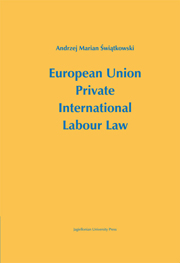Book contents
- Frontmatter
- Contents
- Introductory Comments
- Part I Preliminary Part
- Part II Conflicts of law of individual labour law in the light of the Rome Convention of June 19, 1980 and Regulation of the European Parliament and the Council of the European Communities No. 593/2008 of June 17, 2008 on the law applicable to contractual obligations (“Rome I”)
- Chapter 1 Rome Convention
- Chapter 2 Resolving conflicts of substantive labour law in the Rome Convention (“Rome I”)
- Chapter 3 Converting the Rome Convention into Regulation No. 593/2008 (“Rome I”)
- Part III Conflict of law issues in individual labour law in light of the Regulation (EC) No. 864/2007 of the European Parliament and the Council of the EU (July 11, 2007), concerning law applicable to Non-Contractual Obligations (“Rome II”)
- Part IV Conflicts of law in collective labour law
- Part V Conflicts of law in social security – the coordination of national social security systems of EU Member States according to the regulation of the European Parliament and Council Regulation (EC) No. 883/2004 of April 29, 2004 on the coordination of social security systems
- Part VI International procedural labour law of the European Union
- Selected bibliography
Chapter 2 - Resolving conflicts of substantive labour law in the Rome Convention (“Rome I”)
from Part II - Conflicts of law of individual labour law in the light of the Rome Convention of June 19, 1980 and Regulation of the European Parliament and the Council of the European Communities No. 593/2008 of June 17, 2008 on the law applicable to contractual obligations (“Rome I”)
Published online by Cambridge University Press: 05 September 2014
- Frontmatter
- Contents
- Introductory Comments
- Part I Preliminary Part
- Part II Conflicts of law of individual labour law in the light of the Rome Convention of June 19, 1980 and Regulation of the European Parliament and the Council of the European Communities No. 593/2008 of June 17, 2008 on the law applicable to contractual obligations (“Rome I”)
- Chapter 1 Rome Convention
- Chapter 2 Resolving conflicts of substantive labour law in the Rome Convention (“Rome I”)
- Chapter 3 Converting the Rome Convention into Regulation No. 593/2008 (“Rome I”)
- Part III Conflict of law issues in individual labour law in light of the Regulation (EC) No. 864/2007 of the European Parliament and the Council of the EU (July 11, 2007), concerning law applicable to Non-Contractual Obligations (“Rome II”)
- Part IV Conflicts of law in collective labour law
- Part V Conflicts of law in social security – the coordination of national social security systems of EU Member States according to the regulation of the European Parliament and Council Regulation (EC) No. 883/2004 of April 29, 2004 on the coordination of social security systems
- Part VI International procedural labour law of the European Union
- Selected bibliography
Summary
Freedom of choice
The first sentence of Article 3, paragraph 1 of the Rome Convention stipulates that “the contract shall be governed by the law chosen by the parties.” Thus, the most important provision of the Rome Convention approved the achievements of the internal rules of private international law of the Member States of the European Economic Community. Freedom of the contracting parties with an international element to choose the law applicable to regulate the content of the rights and obligations of labour relations has a long tradition in Europe. The authors of the report commenting that provision of Article 3 of the Rome Convention, draw attention to the established since 1910 judicial French doctrine of autonomy de la volonté, freedom of choice of law enshrined in 1896, in German law, and even before, because already in 1865 formulated the implementing rules for the Italian Civil Code, the principle of freedom of contract under which the parties have the legal contractual relations with a foreign component of the national system to choose the substantive law applicable to regulate the rights and duties of these relations. In precedents mentioned in the report, including international treaties, national legislation, the English and Scottish court decisions support the contention that in the Member States of the European Economic Community, there was full compliance of opinion that parties to contractual relations should have the assurance of full freedom of choice of the national system of substantive law under which all rights and obligations will be determined.
- Type
- Chapter
- Information
- European Union Private International Labour Law , pp. 90 - 139Publisher: Jagiellonian University PressPrint publication year: 2012



